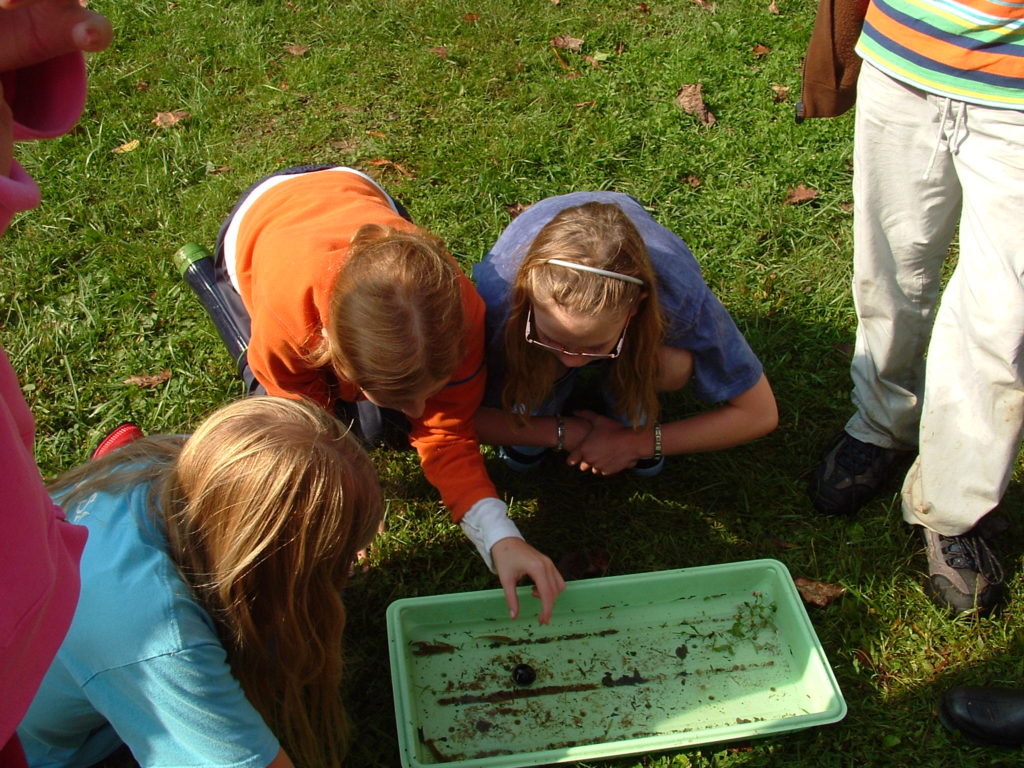Pine Mountain Settlement School
Series 09: BIOGRAPHY
Series 13: EDUCATION
Nancy Sather
Staff
Educational Planning

Stream Ecology class. Environmental education class – St. Francis School. [st-francis-019.jpg]
NANCY SATHER Correspondence 1969 Educational Planning
TAGS: Nancy Sather, educational planning, Loren W. Kramer papers, Loren Kramer, Mary Rogers, Burton Rogers, Community School, environmental education, junior colleges, field courses, adult education, conservation studies, nature recreation leaders, forestry and biology students, interpretive biology, art culture and sociology, Appalachian studies, internships, nature study centers
The following document was found among the papers recently donated to Pine Mountain Settlement School by Loren W. Kramer, a colleague of Nancy Sather. Nancy, Loren, and other staff were invited by then-Director Burton Rogers to put forward their ideas regarding future education directions for the School.
The closure of the Boarding School and the subsequent development of the Community School, administered in a partnership with the Harlan County Board of Education, worked for several years but the need for a county school on the north side of Pine Mountain was great and the momentum to build a school at Green Hills near Pine Mountain forced the Settlement School to look deeply at its future.
This educational planning document and others submitted by staff at the Settlement provide a clear picture of the migration toward a development of the Environmental Education at the School. It was a direction that Nancy Sather supported as did others. Nancy’s letter, as well as those of her colleagues, including the Kramers and particularly Mary Rogers, formed the backbone of what would become a strong unique (at the time) push to raise environmental education in the mountains of Eastern Kentucky.
TRANSCRIPTION: NANCY SATHER Correspondence 1969 Educational Planning
[Note: The following text has been slightly edited for readability.]
01
September 30, 1969
[Handwritten notation: “by Nancy Sather”]
In contrast to Hindman, and perhaps in contrast also with the intent of Pine Mountain when it started serving the public school, I feel that the community which Pine Mountain can most appropriately serve is much much wider than this valley. We have the physical plant, the acreage, the lovely setting, and the unspoiled woods all in the midst of an eminently rural community, which make us an appropriate place for the bringing together of people from a much wider area. Although our physical plant cannot totally dictate our future program, it is a large part of what we have to offer and is too fine and in too good a state of repair to be ignored. Rather, our goal should be to make fullest use of our plant, but to be sure this is a creative use.
Like several of the board of advisors, there are certain things I would not like to see Pine Mountain become. Two of these are perhaps the two roads of least resistance, the road of becoming a boarding facility for upset or homeless children and the road of becoming purely a conference center. We should be not only a place but a continuing program. There is a need for children’s homes, yes, but there is a greater need for creative demonstrations of what can be done on other frontiers of education. Education in this sense would be more than that formal academic process which we equate with schooling. I like very much the idea of a “junior college” proposed by one of the advisors. I do not see this as a duplication of places such as Cumberland and Hazard. Nor do I see it as another Brasstown.
I like to envision the future possibilities of Pine Mountain serving two communities, both a local and a wider community. Some of the ideas which I am about to suggest are things I have had in mind ever since I first saw this plant and met [your] people. One aspect of my suggestions is an outgrowth of my summer’s experience at the field station. Some of these ideas occurred to me only today as you read the suggestions of the trustees and advisors.
First of all, I would see us leaving “regulation” education of kindergarten through high school in the hands of public educators in order to free all of our plant and personnel for a broader education program. This new program I would see as fourfold. It is my belief that the formally educated and the academic modes of education are too separated from that education which is simply life. This is one of the problems which makes current college education seem irrelevant to many students. I believe that we could serve a very unique role in bringing adult education for both the “educated” and the “illiterate” and all “levels” in between into one scene. I believe that these suggestions would enable us to continue to serve our local community in new ways while at the same time making our unique location and community, our forests, the local cultural heritage, and all that can be learned from the lifeways of our local neighbors available to those who are learning on a “higher” level of education.
In addition to the notion of a “junior college” with a technical and folk school orientation so well proposed by one of the advisors, I would like to suggest the incorporation of three other aspects into the whole program.
Our unspoiled land should not be wasted. We have here a perfect center for the training of three groups of people: an educated local citizenry active in conservation practices, nature recreation leaders (who would be people from the “outside”), and forestry and biology students. Why not have part of our total program available to both local adults and any “junior college” students be a joint program in conservation conducted in cooperation with local colleges, perhaps from throughout Kentucky, by which college students, graduate students, and faculty in these fields (all in small numbers) would have the opportunity to work with local citizens on conservation projects at the same time having some of their faculty present more academic course work part of the time. Nature recreation leaders could learn by leading local nature recreation. In the entire state of Kentucky there is no biological station run by any of our colleges (according to my professors at Itasca and what I could tell by investigating the literature.)
02
A select group of students from a group of cooperating colleges could be in residence here for one-term periods in which they would study academically some aspect of nature in the field. Take for example, conservation. Not only do we have our unspoiled situation here but some fine examples of spoiled land near at hand. Even so academic a subject as botany of invertebrate ecology could easily be offered. Such field courses require little equipment which the cooperating institutions would not be able to contribute for short terms. The potential academic students would be those interested in future careers as ranger naturalists or other aspects of interpretive rural environmental science. The local community would hopefully benefit from their knowledge. They would benefit [immensely] from working with people in the area, since that is what interpretive biology is all about. Our land would not be wasted, but neither would it be spoiled. It is one of the most important things we have to offer.
A second important thing we have to offer is the local traditions of mountain crafts and culture. This is where the folk school aspect of the program comes in. As in biology, I can envision groups of academic people from a group of cooperating Southern Appalachian and Kentucky colleges using us as a home base where they could study what we have to offer, at the same time contributing their academic knowledge in such things as classes in folklore (whether called that or not) for the students of the “junior college.” This goes along with the center for Appalachian studies workshops suggested by one of the advisors. These would also perhaps be the people who could help our students understand some of the ramifications of immigration to the cities.
Berea suggests they would like a rural experience for student teachers. The new organization of settlements is discussing the possibilities of internship programs. Our own community adults are asking for “adult education” courses in the formal academic sense. It appears to me that our situation would be ideal for the training of adult educators. This would be a good center for a field experience for people in an academic higher education program in adult education. We could offer them an in-residence kind of student teaching experience working with local adults. Little is being done in this field throughout the plateau, They could teach not only in this valley but at outposts in neighboring counties. Their own seminars could take a part of their time.
Thus I envision a four-fold program: (1) a “junior college” of the type proposed by one of the advisers, supplemented by additional resource people who would in a way add to the curriculum in the fields of (2) natural sciences and conservation, (3) art culture and sociology (Appalachian studies), and (4) basic adult education. I would hope that these interns who would be with us from institutions of higher learning would be with us for periods of time at least the length of a college term. We would have an ongoing program, either having only a few in each field at a time or having them at different terms of the year. Of course, we would have our own ongoing staff of our small “junior college.” Both our” junior college” students and our academic students would be at least partly residential, which would probably require one more residential building — therefore more money.
Because of the pressure for relevance in academic education right now, because of the focus on subcultures and poverty, because of the increasing awareness of the need for adult and continuing education and the need to understand the environment, it seems to me that the chances of getting funding for these supplementary parts of the program might be favorable.
With regard to our current staff, we have here now resource people who would be invaluable in the “junior college” program and also in acquainting the more academic people with the area. I am thinking especially of Matt [Boggs], Brit [Wilder], and the Pattersons [Jess Patterson], each in their own fields. We also have the “educated” people who are capable of the “calculated conformity,” the flexibility to communicate with both groups of people. Colleges are ripe for this kind of experiment and I do not think they would overrun us, for I view this as a selective program for which
03
the participants would be a small group of mature students with a sense of direction but a desire for real rural field experience. We would need to work to recruit our first “junior college” students; perhaps some of them could be referred to us by our fellow settlement institutions. Interest by local citizens could be increased by a gradual increase and expansion of the areas in which we offered classes, starting with the academic realm which they are now demanding. Our goal would be the enrichment of life for all the people involved in our programs. It would be such that once they had been a part of this joint teaching-learning experience it would make a difference.
[Signed] Nancy Sather
Note to Mary [Rogers], Loren and Poppy [Kramer]
As you can see this original letter to Burton [Rogers] (minus an introductory paragraph thanking him for the opportunity to express ourselves and comparing our situation with Hindman) dwells much on the junior college idea, mainly because I had not the gall, (and had not really thought through thoroughly enough) to present the field station or nature study center which was really on my mind. I intend to work on a kind of more specific prospectus incorporating some of the things we discussed the other day, partly for myself, and may work it up as a more thorough treatment of the field station part of this statement. Will make copies for you.
GALLERY: NANCY SATHER Correspondence 1969 Educational Planning
- 01 [sather_n_corr_1969_edu_plans_001]
- 02 [sather_n_corr_1969_edu_plans_002]
- 03 [sather_n_corr_1969_edu_plans_003]
SEE
ENVIRONMENTAL EDUCATION Guide
NANCY SATHER Staff and Trustee – Biography
LOREN W. KRAMER Staff – Biography




